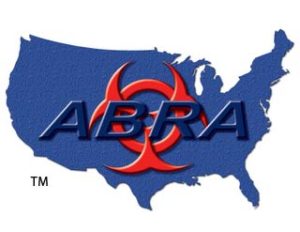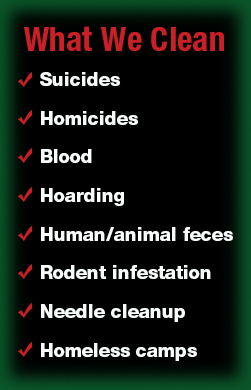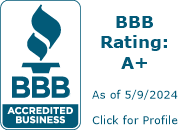Crime Scene Clean Up FAQ’s
1) Who pays for crime scene clean up? Homeowners are responsible for paying for services, but insurance usually covers the cost of decontamination of the property and some personal items. We work closely with all insurance companies and will work hard throughout the claims process to keep things running smoothly. Law enforcement does not pay for decontamination.
2) I heard that crime scene cleanup fees are not cheap, what if I can’t afford it? Fees can be expensive, but we will NEVER turn you down for crime/trauma cleaning. If you cannot afford to pay your deductible or the full price of the decontamination (if not covered by insurance), we will work with you to figure out a payment plan, reduce the fee/deductible, or waive the deductible.
3) Why hire a crime scene clean up company such as Bio Decon Solutions? Nobody wants the responsibility of having to clean up the aftermath after a homicide, suicide, or decomposing body. It’s a liability for an employer to have employees clean up blood and other body fluids who are not certified in bloodborne pathogen, respiratory protection, and hazard communications and who do not have training on how to decontaminate biohazard scenes. All Bio Decon Solutions staff members have crime and trauma scene clean up training and all required certifications to be OSHA/WISHA compliant.
4) If I’m a business owner, can I have my employees clean up biohazardous waste? Employees need to comply with OSHA/WISHA regulations and complete Bloodborne Pathogens, Respiratory Protection, and Hazard Communications certifications. Employers would be liable and subject to large fines if an employee was injured or the job was not decontaminated properly.
6) How do you dispose of the infectious waste? We utilize the infectious waste pickup services of Murrey’s Disposal Company and they dispose of it properly by following all local regulations.
Hoarding FAQ’s
1) What can I do if I know someone who hoards and they don’t want help or who don’t think they have a problem? There’s not a lot we can do if the person who hoards does not want help. You cannot force them to get help or get help for them without them knowing. For example, if they are a patient in the hospital or a nursing facility and that’s when you decide to cleaned up, we will need permission and signed contracts from the person who hoards unless you have power of attorney.
2) How does your cleaning process work? Do you only throw everything out? Will you search for items? You are the customer and in control. It’s your stuff and you have the ultimate control, but we are there to help and will try to persuade the best we can for you to let go of items. We normally are looking out for something important such as money, documents, jewelry, items with senitmental value, etc.
3) Do you donate/recycle anything or is everything taken to the dump? We do donate items that we deem salvageable, that are in good shape, and that can be cleaned off easily. We recycle scrap metal, larger quantities of paper items, cardboard, glass bottles and cans. We E-recycle computers and other electronics at businesses that participate in WA State’s E-Cycle program such as Goodwill.
4) Is there anything that you will not remove? We don’t take hazardous chemicals due to the cost of properly disposing them. Most county health departments have free hazardous chemical disposal programs at specified locations for home owners and tenants in the county. Businesses are not included in these programs, even when the chemicals come from homes within the county. Call your local health department or waste management company.




